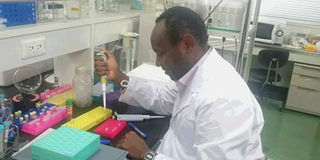Five Kenyan scientists shine in Africa research fellowships awards

Jesse Gitaka, an infectious disease specialist, conducts research on malaria. PHOTO | NATION MEDIA GROUP
What you need to know:
The top Kenyan scientists who won the fellowships include Ms Esther Muema who is based at University of Pretoria in South Africa.
- Another Kenyan winner is Mr Nicholas Musyoka of Council for Scientific and Industrial Research based in South Africa.
Five Kenyan scientists are among the 29 African researchers awarded the lucrative Future Leaders- African Independent Research (FLAIR) fellowships. The fellowships are also supported by the African Academy of Science and Royal Society.
The research fellowships are sponsored by United Kingdom Global Challenges Research Fund which has pumped in Sh196.5 billion which forms part of the United Kingdom Government Official Development Assistance (ODA) commitment.
SOIL FERTILITY
The top Kenyan scientists who won the fellowships include Ms Esther Muema who is based at University of Pretoria in South Africa.
In her winning research proposal, Ms Muema aims to identify local rhizobia bacteria to better understand their interaction with chickpeas, leading eventually to enhanced crop production and soil fertility in parts of South Africa.
Mr Jesse Gitaka of Mount Kenya University aims to overcome sexually transmitted infections and save lives by developing a screening method using common bacterial DNA markers associated with an infection to identify infectious problems earlier.
Ms Lilian Wambua of International Livestock Research Institute (ILRI) research work revolves around infections from antimicrobial – resistant bacteria which are increasing and are time consuming, expensive and vulnerable to contamination.
Ms Wambua plans to develop sensitive diagnostic tests to address these shortcomings.
Another Kenyan winner is Mr Nicholas Musyoka of Council for Scientific and Industrial Research (CSIR) based in South Africa.
Mr Musyoka’s research will revolve around biogas- a renewable energy source composed of fermented organic matter.
He will seek to curb pre-existing and challenging waste streams which include plastic refuse, combustion exhaust and wastewater and use them to process raw biogas into biomethane.
PREMATURE FLOWERING
For Mr Samuel Muiruri of International Institute of Tropical Agriculture (IITA), his project plans to speed up the breeding and cultivation process of cassava through genetic manipulation to induce premature flowering.
South Africa leads the list of researchers who won the fellowships with nine scientists followed by Kenya (5), Ghana (4) and Ethiopia, Uganda, Nigeria, Cameroon have two scientists each while Sudan, Zimbabwe and Malagasy had one scientist each.
The fellowship attracted a total of 400 scientists across the continent.
According to African Academy of Sciences this is the second cohort of research fellowships targeting outstanding early career African Scientists.
CLIMATE CHANGE
“Their research is diverse, ranging from new techniques for sustainable agriculture and fisheries ,managing water shortage to mitigate the worst impacts of climate change , improved methods to store clear energy and targeting health conditions that are most acute for people in Africa,” read part of the statement by the African Academy of Science.
The report which was released On May 12 in Nairobi further stated that Africa needs to pay urgent attention to growing and retaining scientific talent to keep improving the continent’s scientific input and its sustainable development.
The next round of FLAIR applications is ongoing and will close on May 27.




